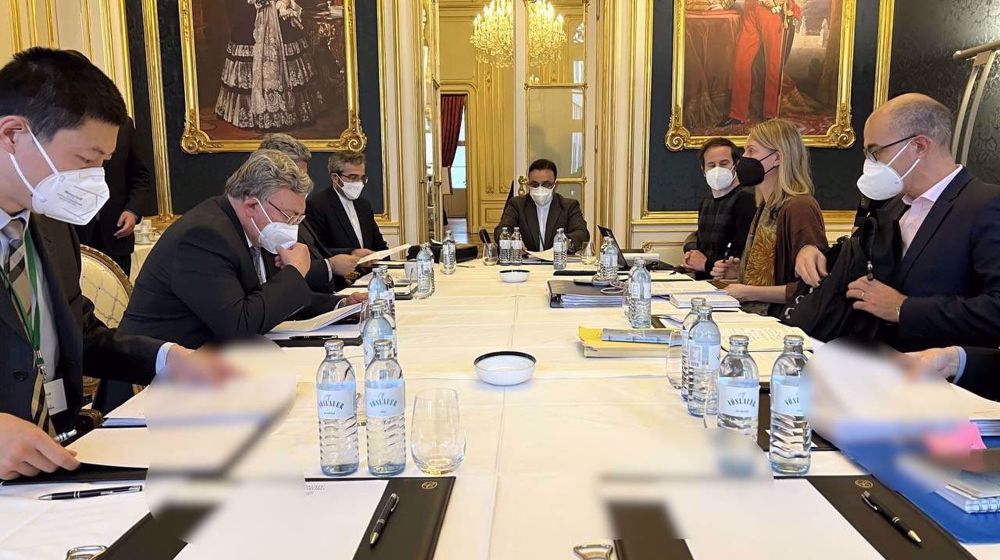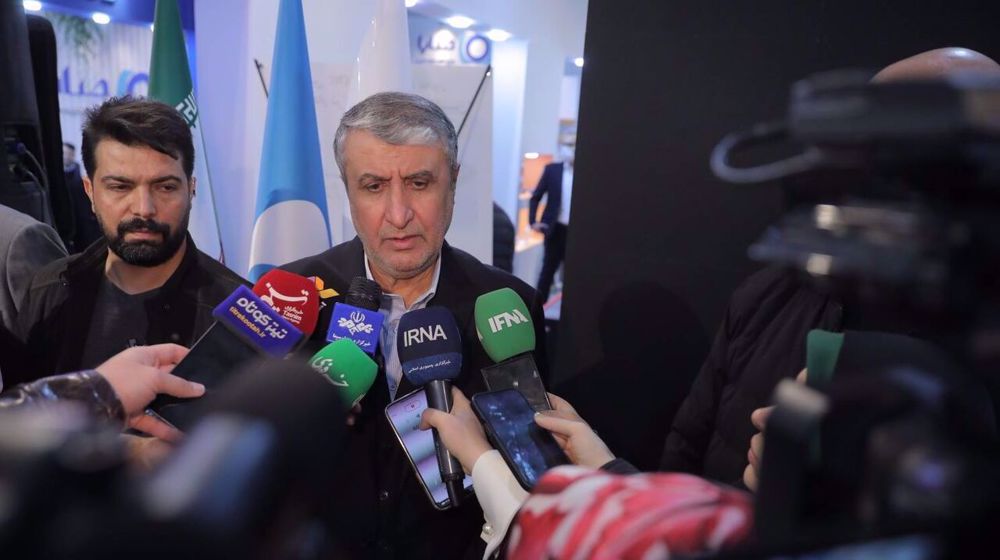Vienna talks: Iran, P4+1 delegations discuss draft texts on guarantees, verification
As Iran and the five remaining parties to the 2015 agreement continue their intensive diplomatic efforts in the Austrian capital of Vienna to revive the landmark deal, senior representatives of the two sides and the European Union discuss draft texts on guarantees and verification of the removal of all US sanctions on Tehran.
Iran's chief negotiator to the Vienna talks Ali Bagheri Kani on Monday held talks with delegates of the P4+1 group of countries -- Britain, France, Germany, Russia and China -- as they attended a meeting on Sunday.
Iran and the remaining participants to the deal, officially known as the Joint Comprehensive Plan of Action (JCPOA), have been holding talks in the Austrian capital since April last year with the aim of reviving the deal by bringing the US into full compliance.
The US left the JCPOA in May 2018 under former President Donald Trump. The Vienna talks began on a promise by Trump’s successor, Joe Biden, to rejoin the deal and repeal the so-called maximum pressure campaign against Iran. Biden, however, has so far failed to undo Trump’s own undoing of Barack Obama’s Iran policy, which led to the JCPOA in June 2015.
The Iranian chief negotiator on Monday also held a meeting with Enrique Mora, the European Union’s deputy foreign policy chief and head of the JCPOA Joint Commission.
Meanwhile, talks between experts of Iran and the P4+1 group of countries are also underway.
Analysts believe that the Vienna talks are advancing at an optimal pace and if all sides act realistically, a final agreement could be achieved within a logical time interval.
Practical ideas have been already offered by Iran on such issues like US guarantees and verification of sanctions removal, and negotiating parties have started to turn those ideas into texts since a while ago.
In fact, since the United States was the party that withdrew from the JCPOA, it will be obliged to take the necessary steps to return to full compliance with the accord. After US steps are verified, then Iran will stop its remedial actions taken under the stipulations of the 2015 agreement.
Experts maintain that the Islamic Republic of Iran has attended Vienna talks with a constructive approach and the Iranian delegation is bent on achieving an agreement on the basis of clear principles and norms that it values. Washington, therefore, must take advantage of this opportunity to prevent further escalation of tensions and later disputes in the West Asia region, which would not be to its benefit.
The eighth round of the Vienna talks began on December 27 with a focus on the removal of all sanctions that the United States had imposed on Iran after its unilateral withdrawal from the JCPOA. The US is not allowed to directly attend the talks due to its pullout in 2018 from the deal with Iran.
During the new round of talks, Iran has rejected the notion of setting timelines for achieving an agreement, with its representatives, noting that they prefer to clinch a logical accord within a logical period of time. Iran has also made its agreement to a new accord conditional on the realization of the Iranian nation's rights and interests.
As a result, the Iranian negotiating team has said time and again that achieving an interim deal is out of the question as Tehran seeks a sustainable, reliable and definitive agreement on the removal of sanctions imposed on the country.
The Islamic Republic has also rejected the pessimistic assessment of the talks by the US and the European trio – namely France, Britain, and Germany – as a psychological ploy to win concessions.
While the Iranian side has entered the new round of talks with clear-cut positions and well-define principles, the Western side, on the contrary, has proved to be riddled with many rifts and differences among them. The differences not only exist between the remaining members of the JCPOA and the United States, but even within the American team, which has been following the talks without being part of them.
Iran, P4+1 drafting important part of outcome document: Russia lead negotiator
In a tweet on Monday, head of the Russian negotiating team Mikhail Ulyanov said Iran and the P4+1 group of countries are working on the drafting of an "important part of an outcome document of the Vienna talks" despite certain outstanding issues.
#Iran, #E3,#Russia and #China continued today the drafting of an important part of an outcome document of the #ViennaTalks. It was a more or less successful exercise although some outstanding issues still remain in the relevant segment of an outcome document. pic.twitter.com/4V9c5H0AlX
— Mikhail Ulyanov (@Amb_Ulyanov) January 24, 2022
"It was a more or less successful exercise although some outstanding issues still remain in the relevant segment of an outcome document," Ulyanov, Russia's Permanent Representative to International Organizations in Vienna, tweeted.
In another tweet on Sunday, the top Russian diplomat said head of the negotiating teams of Iran, the three European parties to the JCPOA (E3), Russia and China "addressed one of the most important and complicated issues on the agenda of the Vienna talks" during their meeting.
This evening #Iran, #E3, Russia and China met at the level of heads of delegations. Together we addressed one of the most important and complicated issues on the agenda of #ViennaTalks. Without any doubt we made some progress and will continue discussions and drafting tomorrow. pic.twitter.com/m1INBqISSG
— Mikhail Ulyanov (@Amb_Ulyanov) January 23, 2022
"Without any doubt we made some progress and will continue discussions and drafting tomorrow," he wrote.
Hamas blasts Western media for blindly defending false Israeli narrative
ElBaradei condemns US threats of military action against Iran
‘No two-hour war’: Iran vows immediate retaliation to any attack
VIDEO | US warmongering threatens stability
Pezeshkian: US must end provocations if it seeks genuine diplomacy
Iran summons German ambassador over Merz’s ‘low-minded’ remarks
Iran's Armed Forces warn EU of ‘consequences’ of IRGC designation
Iran FM: EU’s blacklisting of IRGC a ‘major strategic mistake’










 This makes it easy to access the Press TV website
This makes it easy to access the Press TV website